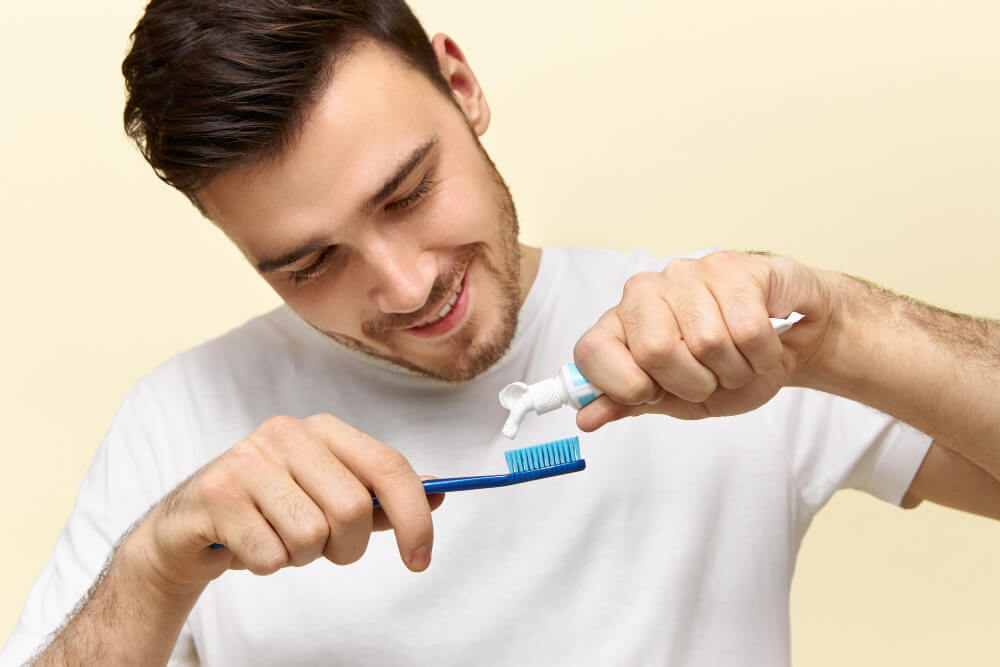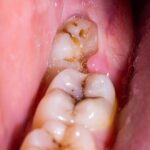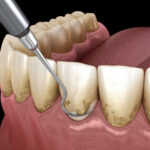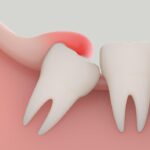Does Toothpaste Expire?

Yes, toothpaste does expire. Most toothpaste tubes are marked with an expiration date, which is typically about two years from the date of manufacture. While expired toothpaste isn’t harmful to use, it may not be as effective.
The fluoride in toothpaste, which helps protect your teeth from cavities, can degrade over time. Also, the consistency and taste of the toothpaste might change.
Table of Contents
Why Does Toothpaste Expire?
Toothpaste expires for several reasons related to its ingredients, effectiveness, and safety.
Here’s a breakdown of the key factors that contribute to the expiration of toothpaste:
Active Ingredients Degradation
Toothpaste contains active ingredients such as fluoride, which is essential for preventing tooth decay by remineralizing enamel and making teeth more resistant to acid attacks.
Over time, these active ingredients can degrade or become less effective, diminishing the toothpaste’s ability to protect your teeth as intended.
Preservative Effectiveness
Preservatives are added to toothpaste to prevent microbial growth and maintain the product’s safety for use. The effectiveness of these preservatives can diminish over time.
Once a toothpaste surpasses its expiration date, there’s an increased risk that bacteria or mold could grow within the product, especially if the tube has been opened and exposed to the environment.
Physical and Chemical Stability
The consistency of toothpaste is designed to be stable over a certain period, allowing for easy application and optimal performance. As toothpaste ages, it may separate, harden, or change texture, affecting its ease of use and potentially its cleaning efficiency. The flavoring agents in toothpaste can also degrade over time, affecting the taste.
Regulatory and Quality Assurance Reasons
Manufacturers set expiration dates to ensure that the product meets the quality and safety standards up to that point. This is part of complying with regulatory requirements and providing consumers with a guarantee of the product’s effectiveness and safety within a specified timeframe.
Packaging Integrity
The materials used to package toothpaste, such as plastic tubes, are designed to protect the product from air and contaminants. Over extended periods, the integrity of the packaging might degrade, potentially allowing external substances to compromise the toothpaste’s quality.
How Long Does Toothpaste Last?
The shelf life of toothpaste can vary depending on the brand, ingredients, and storage conditions, but most toothpaste is designed to last between two to three years from the date of manufacture.
Here’s a closer look at what impacts the longevity of toothpaste and how you can tell if it’s still good to use:
Manufacture vs. Expiration Date
Toothpaste tubes are often marked with a manufacture date or an expiration date. The expiration date is typically set around two to three years after the manufacture date, indicating the period within which the product is expected to remain most effective and safe to use.
Active Ingredients Stability
The stability of active ingredients, like fluoride, is a critical factor in determining the shelf life of toothpaste. These ingredients are most effective within the product’s intended shelf life.
Unopened vs. Opened
Unopened toothpaste, stored under proper conditions, can last up to its expiration date without significant degradation in quality or effectiveness.
Once opened, toothpaste is exposed to air and environmental contaminants, which can slightly accelerate the degradation process, although it’s generally still safe to use until the expiration date if stored properly.
Storage Conditions
How toothpaste is stored can affect its longevity. It should be kept in a cool, dry place to prevent the breakdown of active ingredients and to maintain its texture and consistency. Extreme temperatures, either hot or cold, can adversely affect toothpaste.
How Can I Keep Toothpaste Fresh?
To keep toothpaste fresh, store it in a cool, dry place away from direct sunlight and extreme temperatures. Ensure the cap is tightly sealed after each use to prevent the toothpaste from drying out and to maintain its effectiveness.
Avoid storing toothpaste in humid areas, like a bathroom shower area, as moisture can affect its consistency. Proper storage helps maintain the toothpaste’s efficacy, texture, and flavor up to its expiration date, ensuring you get the full benefit of its ingredients for optimal dental health.
Expiration dates explained
Expiration dates indicate the last day a product is expected to maintain its highest level of quality and effectiveness. Manufacturers set these dates based on testing and the stability of ingredients over time.
For perishable items, such as food and medications, the expiration date is critical for safety, indicating when it might become unsafe to consume or use.
For non-perishable goods, it more so reflects a period of optimal performance.
Is expired toothpaste safe to use?
Using toothpaste past its expiration date is generally considered safe, but it may not be as effective. The main concern with expired toothpaste isn’t safety but rather a decrease in its efficacy, especially in its fluoride content, which is essential for preventing tooth decay.
Over time, the active ingredients can degrade, and the toothpaste may not perform as expected in strengthening tooth enamel and protecting against cavities.
The texture, consistency, and taste of toothpaste may change over time.
While it’s unlikely to cause harm, for optimal dental health benefits, it’s best to use toothpaste within its recommended shelf life.
What can I do with my expired toothpaste?
Expired toothpaste, although not recommended for brushing your teeth due to reduced effectiveness, can still be repurposed for several household tasks. Here are some creative and practical uses for expired toothpaste:
- Cleaning: Toothpaste is mildly abrasive, making it great for removing stains and polishing surfaces. Use it to clean jewelry, brighten sneakers, scrub bathroom sinks, shine chrome fixtures, and clean the iron plate.
- Deodorizing: It can help neutralize odors. Apply a small amount to your hands to remove strong smells like garlic or fish. It can also be used in containers or on surfaces to freshen up.
- Removing scratches: Toothpaste can be used to buff out minor scratches on various surfaces, including glass, screens of smartphones and watches, and even car headlights, restoring clarity and shine.
- Pest control: Some claim that toothpaste can deter ants and other small pests due to its strong scent and minty ingredients. A small line of toothpaste can act as a natural repellent in areas of entry.
- Relieving irritation: Toothpaste has been used as a home remedy for soothing irritation from bug bites or minor burns, although this should be done with caution and awareness of potential skin sensitivity.
- Filling small holes: For a quick fix, toothpaste can be used to fill small holes in walls, acting as a makeshift spackle. It’s best for temporary solutions until proper repairs can be made.
What Happens After the Expiration Date?
Toothpaste technically doesn’t spoil in a way that makes it unsafe to use, but it definitely loses its effectiveness after a while. Here’s the breakdown:
- Reduced fluoride: The main concern with expired toothpaste is the decline of fluoride. Fluoride is key for strengthening tooth enamel and preventing cavities. Over time, especially after two years, the fluoride becomes less potent.
- Less effective cleaning: Toothpaste also contains ingredients that help polish teeth and remove plaque. These might degrade as well, making the paste less effective at cleaning your teeth.
- Unpleasant changes: The texture, taste, and smell of the toothpaste might also change after the expiration date.
In short, using expired toothpaste won’t harm you, but it’s not giving your teeth the full range of benefits you get with a fresh tube.
If you’re in a pinch and need to brush with expired toothpaste, it’s okay. But for your regular oral hygiene routine, it’s best to stick with fresh toothpaste.
FAQ on Does Toothpaste Expire?
Is it OK to use expired toothpaste?
Using expired toothpaste is generally safe, but its effectiveness, especially in terms of fluoride content for cavity protection, may be reduced. While it won’t harm you, the taste and consistency might change. For optimal dental health benefits, it’s recommended to use toothpaste within its expiration date to ensure you’re receiving the full protective and cleaning capabilities it offers.
What is the lifespan of toothpaste?
The lifespan of toothpaste is typically two to three years from the date of manufacture. This timeframe ensures the effectiveness of its active ingredients, such as fluoride, for cavity protection and maintaining oral health. It’s best to use toothpaste within this period to benefit fully from its properties.
How do you know if toothpaste is bad?
To determine if toothpaste has gone bad, look for changes in its texture (such as separation, hardening, or becoming too runny), an unusual smell, or an off taste. These signs can indicate that the toothpaste is no longer at its optimal quality for use.
Can you use toothpaste after 2 years?
Yes, you can use toothpaste after 2 years, but its effectiveness, especially in fluoride’s ability to prevent cavities, may be diminished. While it’s generally safe, use toothpaste that hasn’t expired.
Fact Checked
Our dedicated team rigorously evaluates every article and guide to ensure the information is factual, up-to-date, and free of bias.
Updated Regularly
We update our articles and reviews regularly to ensure you have access to the latest data in the dental industry.
The content on Dental3DU’s blog is intended for educational purposes only. This information should not be relied upon as professional medical counsel. Be sure to always consult with your dentist about the dangers and benefits of any medication, treatment or procedure.




